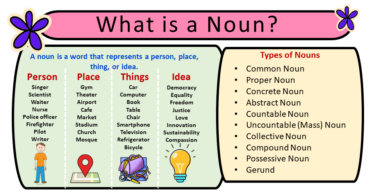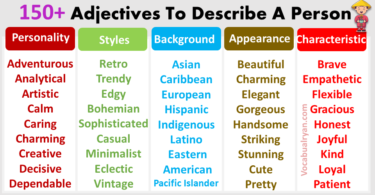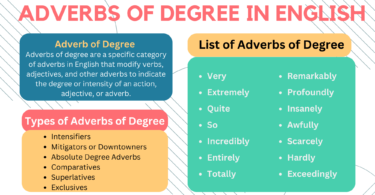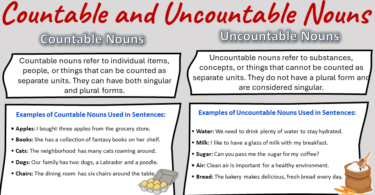Auxiliary verbs are like helper verbs. They help other verbs in a sentence to show things like time, how an action is done, or if it’s happening right now. They’re like the behind-the-scenes workers that make sure sentences sound right. For example, in “She is playing,” “is” is the helper making sure we know it’s happening now. They’re super important for making sentences sound good and make sense in English.
What is an Auxiliary Verb?
Auxiliary Verbs (Helping Verbs): These are verbs that assist the main verb in a sentence. They are used to convey various grammatical meanings, such as tense, voice, aspect, and mood.
Common Auxiliary Verbs
List of common auxiliary verbs in English:
Primary Auxiliary Verbs:
- To be:
- am, is, are (present)
- was, were (past)
- will be (future)
- To have:
- have, has (present)
- had (past)
- will have (future)
- To do:
- do, does (present)
- did (past)
Modal Auxiliary Verbs:
- Can: (present)
- can, cannot (or can’t)
- Could: (past, or for hypothetical situations)
- could, could not (or couldn’t)
- May: (present, for permission or possibility)
- may, may not
- Might: (present or past, for less certainty)
- might, might not
- Shall: (mainly in first-person questions, offers, or suggestions)
- shall, shall not (or shan’t)
- Should: (advice or obligation)
- should, should not (or shouldn’t)
- Will: (future)
- will, will not (or won’t)
- Would: (conditional or polite requests)
- would, would not (or wouldn’t)
- Must: (necessity or strong obligation)
- must, must not (or mustn’t)
Auxiliary Verbs and tens
Auxiliary verbs are instrumental in expressing different tenses in English. They work in conjunction with the main verb to convey the time of an action, event, or state. The primary auxiliary verbs involved in tense formation are “to be,” “to have,” and “to do,” along with modal auxiliary verbs for expressing various shades of meaning.
- Present Simple:
- Affirmative: She plays the piano.
- Negative: She does not play the piano.
- Question: Does she play the piano?
- Present Continuous:
- Affirmative: She is playing the piano.
- Negative: She is not playing the piano.
- Question: Is she playing the piano?
- Present Perfect:
- Affirmative: She has played the piano.
- Negative: She has not played the piano.
- Question: Has she played the piano?
- Past Simple:
- Affirmative: She played the piano.
- Negative: She did not play the piano.
- Question: Did she play the piano?
- Past Continuous:
- Affirmative: She was playing the piano.
- Negative: She was not playing the piano.
- Question: Was she playing the piano?
- Past Perfect:
- Affirmative: She had played the piano.
- Negative: She had not played the piano.
- Question: Had she played the piano?
- Future Tenses:
- Future Simple:
- Affirmative: She will play the piano.
- Negative: She will not play the piano.
- Question: Will she play the piano?
- Future Continuous:
- Affirmative: She will be playing the piano.
- Negative: She will not be playing the piano.
- Question: Will she be playing the piano?
- Future Perfect:
- Affirmative: She will have played the piano.
- Negative: She will not have played the piano.
- Question: Will she have played the piano?
Auxiliary Verbs Used to Express the Mood
Auxiliary verbs are also essential for expressing different moods in English. Moods convey the speaker’s attitude or the necessity of an action. Let’s explore the use of auxiliary verbs in different moods:
- Indicative Mood:
- Used for stating facts or asking questions.
- Example: She is a talented singer. (indicative present)
- Question: Is she a talented singer?
- Imperative Mood:
- Used for giving commands or making requests.
- Example: Play the piano for us. (imperative)
- Request: Could you pass the salt? (imperative with modal “could”)
- Subjunctive Mood:
- Used for hypothetical situations, wishes, suggestions, or expressions of necessity.
- Example: It is essential that she be on time. (subjunctive present)
- Wish: I wish she were here. (subjunctive past)
- Suggestion: It’s crucial that you study for the exam. (subjunctive with modal “should”)
- Conditional Mood:
- Used for expressing conditions or hypothetical situations.
- Example: If it rains, we will stay indoors. (conditional future)
- Hypothetical: I would help if I could. (conditional past with modal “would”)
- Interrogative Mood:
- Used for asking questions.
- Example: Can you pass me the book? (interrogative with modal “can”)
- Emphatic Mood:
- Used for adding emphasis.
- Example: I do love playing the guitar. (emphatic)
- Optative Mood:
- Used for expressing wishes or desires.
- Example: May you have a wonderful day. (optative with modal “may”)
- Dubitative Mood:
- Used for expressing doubt or uncertainty.
- Example: She might be at the party. (dubitative with modal “might”)
- Potential Mood:
- Used for expressing possibility or capability.
- Example: She can play the piano. (potential with modal “can”)
Auxiliary Verbs and Voice
In the passive voice, auxiliary verbs, specifically forms of “to be,” are used in combination with the past participle of the main verb to shift the focus from the doer of the action to the action itself. Let’s explore how auxiliary verbs are used in the passive voice across different tenses:
Present Passive:
- Simple Present:
- Active: The chef cooks the meal.
- Passive: The meal is cooked by the chef.
- Present Continuous:
- Active: The team is building a new website.
- Passive: A new website is being built by the team.
Past Passive:
- Simple Past:
- Active: They repaired the car yesterday.
- Passive: The car was repaired yesterday.
- Past Continuous:
- Active: The workers were installing the new equipment.
- Passive: The new equipment was being installed by the workers.
Future Passive:
- Simple Future:
- Active: She will publish the article next week.
- Passive: The article will be published next week.
- Future Continuous:
- Active: The company will be launching a new product.
- Passive: A new product will be launched by the company.
Present Perfect Passive:
- Present Perfect:
- Active: They have painted the house already.
- Passive: The house has been painted already.
Past Perfect Passive:
- Past Perfect:
- Active: She had prepared the report before the meeting.
- Passive: The report had been prepared before the meeting.
Future Perfect Passive:
- Future Perfect:
- Active: They will have completed the project by December.
- Passive: The project will have been completed by December.
Exercise for Auxiliary Verb
Fill in the blanks with the correct form of the auxiliary verb in parentheses.
- She ____________ (be) studying for hours.
- We ____________ (not/can) find the keys anywhere.
- What ____________ you usually ____________ (do) on weekends?
- They ____________ (not/finish) their project by the deadline.
- By next year, she ____________ (live) in this city for ten years.
- ____________ you ____________ (see) that movie before?
- He ____________ (must) complete the assignment by tomorrow.
- Last night, we ____________ (watch) a fascinating documentary.
- The new software ____________ (install) on all computers next week.
- I ____________ (not/eat) sushi until I moved to Japan.
Answers:
- has been
- can’t
- do; do
- did not finish
- will have lived
- Have; seen
- must
- watched
- will be installed
- had not eaten





Leave a Comment